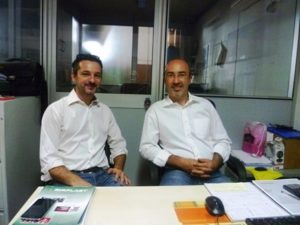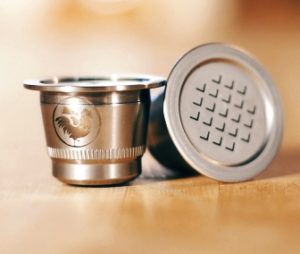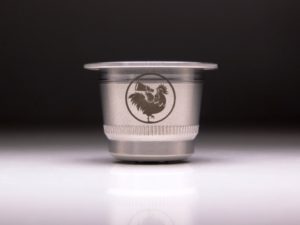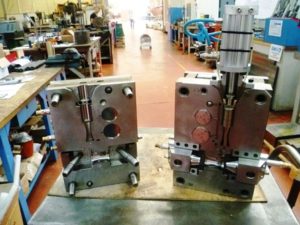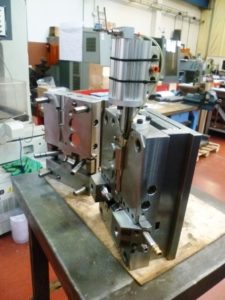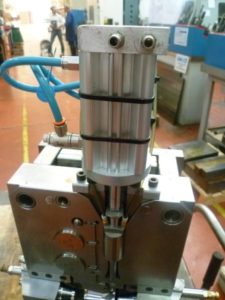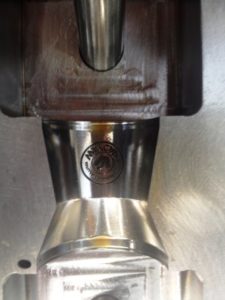A bundle of rods tied around an axe, symbol of Etruscan origin adopted by Romans, intends to highlight that when more people or more elements are committed together to pursuing the same thing, union is strength, and even more if there is a direct line with those offering innovation and vital functions in the manufacturing context.
If various partners succeeded in doing system, it would be smoother and more viable the road leading to what companies set as target, i.e. the customer satisfaction.
Well, the teamwork, for the Italian Cannarozzi Snc, headquartered at Osio Sotto in Bergamo province, is a duty, dealing with the committing challenges of the global market.
To the extent that, for the implementation of the following mould, as many as three partners have collaborated, listened and discussed in the context of an exchange of ideas among various players: the mould engineering company, the mould maker and the buyer.
The result is a really original and precious object, formed by 5 pieces, intended for filling Nespresso compatible coffee capsules, rechargeable and reusable, fully made of ecologic plastic, fruit of the inventiveness of the small Turin company Way Cap Srls, specialized in fashion and industrial design activities.
The whole of three precious competences inside the manufacturing chain leading from the design to the mould, and therefore to the item, has allowed the optimal running of the moulding process.
Players
Like in an orchestra, the note played by each member of the team has matched every other note, to create a fine music, tuned with the service the mould was expected to provide.
Companies are formed by people, each of them acts according to strictly personal motivations and skills, which must pursue an ideal of business profit. In other words: being competitive together is a duty.
Officina Cannarozzi in forty years of activity has specialized in the engineering and production of plastic injection and thermoforming moulds but it operates also in subcontracting precision turning and 5-axis milling.
Technology, research and experimentation are the company’s pillars, the cornerstones that allow manufacturing performing moulds of uncompromised quality.
Excellence created in the workshop on the workbench, able to take care of whatever project, from its birth until its accomplishment and also to make use of cutting-edge machinery giving birth to the most complex products, like the mould of this month.
The mould maker Rimplast Snc, headquartered at Osio Sotto (BG), is a small company for the plastic material moulding, established in 1994 thanks to the corporate union of three young women with a strong will of entering the labour world.
In 2007, they take over the MAM brand, leader in the ventilation sector, and they perform a restyling complying with law regulations for all items, both thermal and electrical.
Now, with the generational turnover that involves the sons’ activity, Rimplast is equipped to execute mould sampling, pre-series and eventual samplings of mould testing. The organizational structure can manage the product assembling, testing, packaging and shipment.
Finally, Way Cap Srls, Turin, simplified limited liability company, operating in industrial design activities, which has devised a sort of funnel to fill the reusable coffee capsules.
These capsules allow the use of any coffee mixture available on the market, granting the average 85% saving compared to the cost of a normal single-portion disposable capsule.
Way Cap, Italian company like a real espresso, has participated in a crowdfunding campaign implemented on Kickstarter, a platform where each company can present its own project and receive funds for innovative projects or products.
In the Way Cap case, the target amounted to 20,000 euros but, thanks to the enormous success met by the object, the company received 234,000, over ten times more.
These are then the three partners that, in the context of simultaneous engineering, have given birth to a sort of “constructive conflict”, since the various players of the work team are aware that the agreement/disagreement is a natural aspect inside group dynamics; it can be even a key factor to reach common targets.
Individuals’ roles were acknowledged and enhanced by an open and clear communication, able to provide acceptable feedbacks on results, like this one of compatible pods, to say “stop” to millions of disposable espresso pods that are cumulated in landfills and elsewhere; an environment-friendly approach conscious of the pleasure of a bar espresso.
The object to be moulded
It is a sort of funnel/doser for filling reusable coffee pods; funnel and capsules have been devised by Way Cap.
It is worth highlighting the merits of Way Cap itself, start-up company in initial phase of its industrial design activities and surroundings, which presented the idea of rechargeable pods to Rimplast and Cannarozzi at Mecspe exhibition in Parma; consequently, thanks to a good teamwork, they shifted from the design to the item (editors’ note: Mecspe exhibitions is organized by Senaf, Tecniche Nuove Group).
Capsules are equipped with a patented system, which allows a perfect extraction and an excellent quality. The system is very practical: thanks to the doser equipping it, it is possible to refill the capsule in less than 30 seconds; after screwing it to the plug, the capsule is ready to be introduced into Nespresso machine.
The system structure is suitable for containing two capsules and being transported everywhere, for instance at work or in any other place. It is as if you always had a coffeepot within reach.

The doser is composed by five pieces that exit simultaneously from the press; the fifth piece not visible in the picture is the small presser cover
The product can be in three colours (white, black and transparent) and is composed by five pieces that leave the press simultaneously ; two pieces are assembled together on the machine, otherwise the thickness would have been excessive; pressing device and small plug are assembled outside the press. The mould is suitably made for implementing the satin-finish logo on polished surface or vice versa.
The object is made of Kostrate® Edge by Maip Group, the revolutionary line of copolymers replacing all transparent materials, suggested by the mould maker Rimplast for its easy processing, utmost degree of transparency, total absence of drying, economic saving from 20% to 30% in processing costs and reduction of CO2 emissions.
It is a material acrylonitrile- and A/B bisphenol-free and it is certified for foods according to FDA, ecologic, non- biodegradable, simply and quickly moulded. It is a copolymer in block, matching the characteristics of PMMA resin with those of Pnba rubber.
The main features of flexibility and resistance to UV-rays make it highly suitable for outdoor applications. It is available in various hardness: from Shore A67 to D65.
The mould
Obviously, protagonist of this success is also the five-impression injection mould of hardened and tempered W 1.2311 steel and then nitrided to harden the impressions; being a start-up buyer, the required batches are currently quite small.
Cannarozzi has chosen a hardened and tempered material, not simply hardened, because the entire project is still in prototyping phase. If there will be then large runs, more hardened impressions will be certainly adopted.
Therefore, a five-impression mould: a small plug, a big plug, the funnel body and a pestle composed by two pieces, a hollow part and a small closure plug to avoid coffee enters inside the pestle itself.
It is absolutely necessary that the various pieces do not deform while moulding.
In design phase, a first difficulty to be overcome was the arrangement of the 5 fully different pieces, which had to be moved through carriages for the undercut extraction.
Two motions were implemented: a mechanical one for carriages and a pneumatic one with a piston. The arrangement included also the runner positioning, very complex issue anyway solved egregiously with the lowest cost and the minor dimensional impact, concentrating everything in the smallest possible space.
Precious indeed for the design of this mould was the equipment of the technical office of Officina Cannarozzi composed by 4 state-of-the-art workstations, software CAD-CAM Cimatron-E 12 and Autocad for 2D. For the mould designer, the mould design was not only the initial phase of a process but instead of the entire manufacturing chain that has decreed the success of the finished object. The result is a moulded kit, already ready for the assembling of the right number of pieces.
The simultaneous filling of different cavities with different thicknesses had to be correctly sized in the various injection points and in the different runners.
The cooling was quite problematic, too, because in certain points the object shows much bigger thicknesses than in others and then it was necessary to condition the mould differently from one side to the other.
The collaboration and the professionalism of the pair Cannarozzi/Rimplast was really precious to obtain an optimal outcome.
The most delicate action was to face the problem of the big presser thickness, which required a particular motion with a cylinder adequately sized, to extract the inner punch; all that to achieve higher cooling in the zone surrounding the highest thickness. All other pieces did not imply particular extraction requirements.
The thickness difference in various points, from 2 to 7 mm, has obviously involved a slowdown of the cycle of the other pieces, which had to suit the descent of the slowest one; in other words, all times were synchronized to make all pieces come out simultaneously.
Minor thicknesses take less time to be processed in comparison with parts with bigger thicknesses, therefore the entire drop cycle of pieces will be constrained by the latter, with the result of attaining anyway a complete set and at each moulding run.
A robot synchronized with the press boxes final products; the buyer is entrusted with the assembling and the final packaging.
The mould was implemented in record times: one month from the design to the object, really short if we consider the engineering complication to match five pieces with different sizes, shapes and thicknesses in a single solution, with reduced motions and spaces.
The mould machining required accurate precision, especially for the presser impression and closures; possible burrs, in fact, might have affected the sealing between pestle and cap.
The used technologies are standard ones: 5-axis milling, plunge and wire EDM, turning, grinding and logo laser engraving; also capillaries were made with laser by Lap Stamp Engraving company at Terno d’Isola-BG, to conform to their sizes.
Conclusion
Quality and collaboration, wellbeing, taste and consumerism, long wave of saving for end users, these are the passwords of this experience “from the idea to the finished item”.
Players, in the current delicate time we are living, pay attention to their actions, without arrogance and with a bit of modesty, fuelled by the spiral of success. The balance is positive.
The destiny of the tooling industry and similar, so important for the economy of our Country, is just linked with the classic stereotype of the mould designer: a bit manager, a bit artisan, a bit exclusive.
It is then a rosy destiny together with its partners. With all due respect to those who fear dramatic conclusions of this crisis but with the certainty we cannot snooze.
Therefore, we must take utmost care and lavish so much creativity in the development of each product typology, moulds for agriculture, for the food industry, for the household sector, toys, the security field, cosmetics, furnishing, packaging and a good coffee.
A good work like this mould and the object it produces always stems from the harmonization of more partners.
Therefore, WayCap compatible capsules solve the disposal problem of their disposable sisters, since reusable endlessly. Consumers will save up to 85% on the cost of capsules for conventional espressos and make the environment happy.
MOULD IDENTITY CARD
Material: hardened and tempered 2311 steel;
Weight: 130 kg;
Sizes: 246x346x227;
Use: production of 5 joinable items to obtain the filling funnel for reusable coffee pods;
Design: internal with Cimatron E12 software;
Material of the moulded component: Kostrate (innovative eco-sustainable coming from USA);
Moulding process: injection;
Customer: WAYCAP Srls (start-up with premises in Turin, Italy);
Yearly pieces: 20,000
Manufacturer: Officina Cannarozzi Snc, via C. Colombo 17, Osio Sotto (BG), Italy phone +39 0354825149;
Mould maker: Rimplast Snc, via dell’Olmetta 26, Osio Sotto (BG), Italy, phone +39 035881447.

